
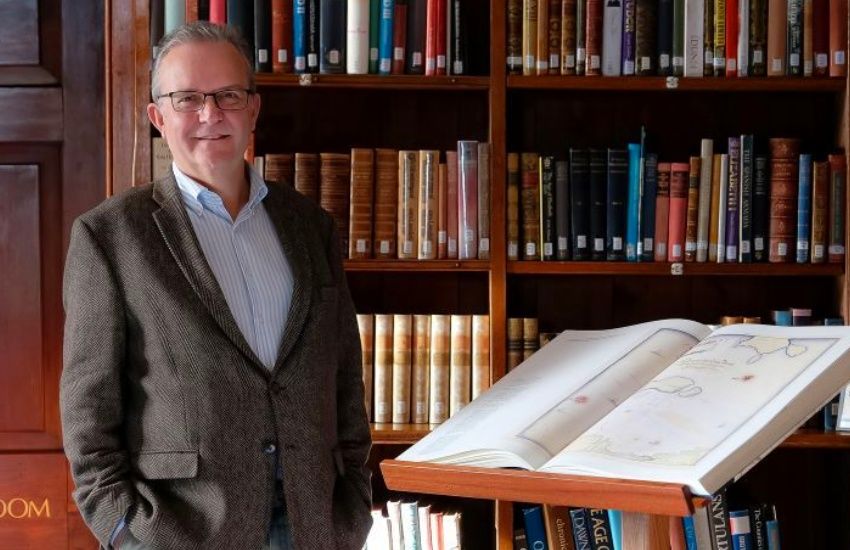

This feature in CONNECT magazine – ‘No Ordinary Day Job’ – meets people who are in their unusual roles for a variety of reasons. Some out of financial necessity; some after a slightly risky career change; some almost by accident. And some, such as Steve Foote, who couldn’t be happier combining work with a lifelong passion or hobby.
Steve is Chief Executive of the Priaulx Library as well as being a frequent publisher of local books, both of which allow him to indulge his deep and enduring interest in Guernsey’s history.
“A lot of people develop an interest in their family history when they’re nearing retirement, but I first became interested when I was in my 20s. It was just something which captured my imagination,” said Steve.
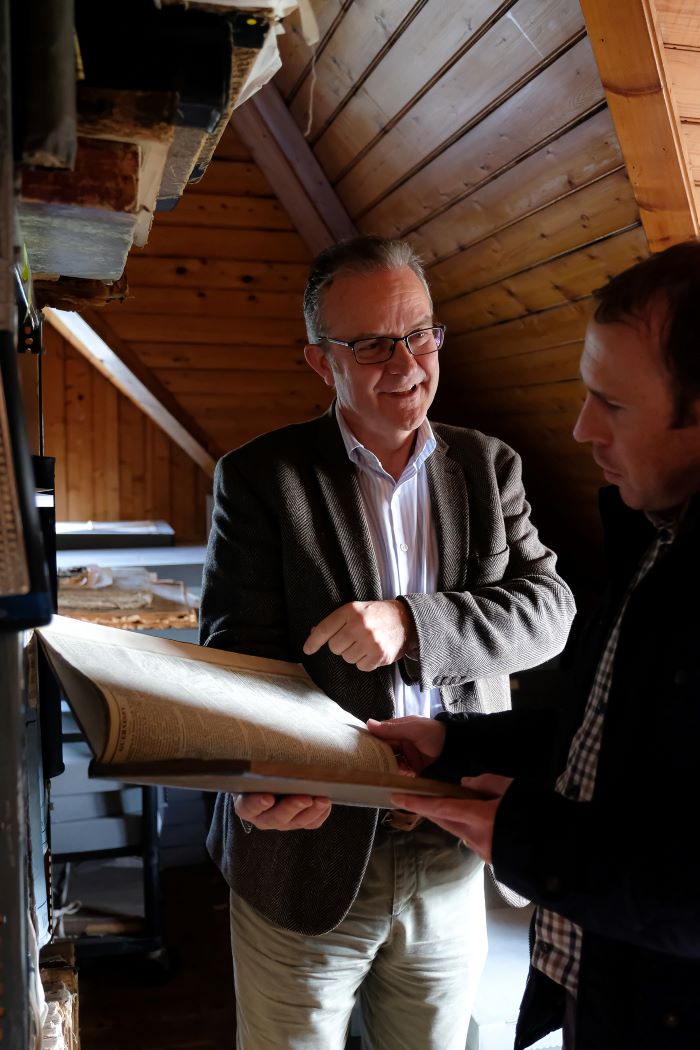
Pictured: Steve Foote, Chief Executive of the Priaulx Library, shows Matt Fallaize, CONNECT Editor, some of the collection which is not normally available to the public.
“My dad inherited some paintings, I asked where they were from, and dad said to go and talk to Aunty Betty. I did and that started a discussion about more than just names and dates and places, but the stories of ancestors, which gives you a sense of where you come from, and it just sparked something which has never left me. It led to an interest not just in a family tree, but in what life was like here a hundred years ago and more – the island’s social history.”
Steve was born and schooled in Guernsey. He actually gave up studying history after O-Levels. “It was all dates of kings and queens and it seemed very remote. It really was local history that I was interested in.” It was to remain only an interest – a hobby, albeit a serious one – for nearly 40 years while Steve earned a living away from the island.
“In the early 1980s, I went off to Brunel University and did a degree in computer science, almost before the personal computer even existed. I spent the best part of 10 years working in IT for ICI, the paint company, including three years in Paris. I then went into a career in management consulting looking after large projects and change programmes.”
Steve returned to Guernsey in 2019 to work for the States. He became Chief Executive of the Priaulx Library this time last year.
“I saw the role advertised and thought it could be the best of both worlds. I have this passion for local history and have been visiting the Priaulx Library for 40 years and this was an opportunity to get involved in shaping the next stage of its journey.”
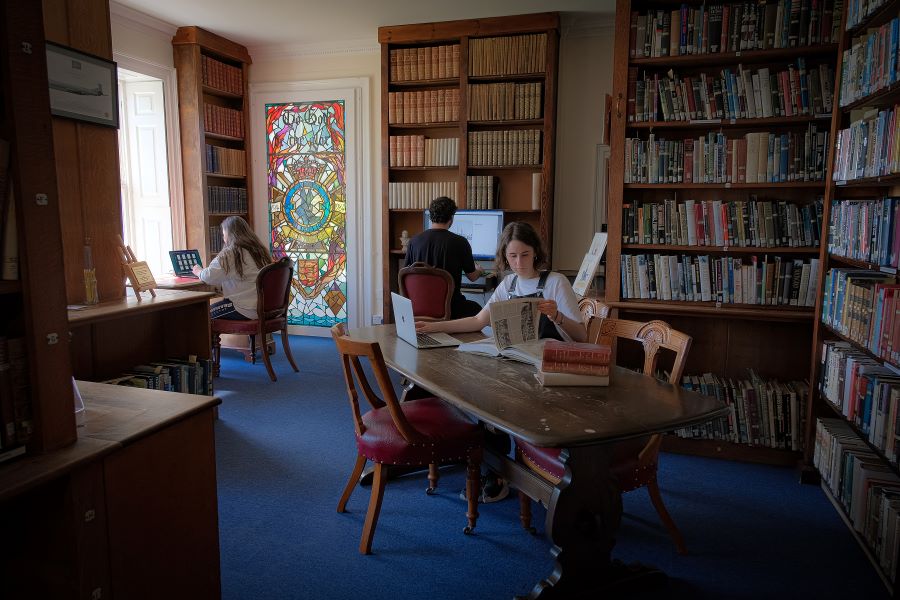
Pictured: Steve wants the Priaulx Library to accelerate its efforts to support a new generation of digital users while maintaining its more traditional services.
The building at Candie which houses ‘the Priaulx’, as it is often known, was a family home for around 100 years before it became a public library in 1889.
“In the 1700s, all the major families lived along the High Street – that was the prestigious place to live. But as it became more crowded, and there were concerns such as sanitation, they started moving out. This building was originally built by the Mourant family around 1790. Then the Priaulx family acquired it. Osmond Priaulx inherited it but never lived here. He lived in London: he was a bibliophile and had a huge library there.
“At that time, the Bailiff, Peter Stafford Carey, was living here. Osmond went into talks with the States because he wanted to leave his book collection and this house to the island. There were a few years of toing and froing, during which time Peter Stafford Carey died, and the States said why not stick the books in the building, and that’s how it became a library.” Unlike the Guille-Allès Library, the Priaulx Library has never charged users. “That was at Osmond’s insistence. He had very enlightened ideas for the time.
“The role of the Priaulx, as distinct from the Guille-Allès, is that we are here to be a centre for local and family history research. That was something decided by a States’ committee in 1983. Otherwise, why have two public libraries in the island? It was a conscious decision that the Guille-Allès should focus on being the extensive lending library and the Priaulx should focus on local and family history research with a more extensive reference collection.
“A lot of local studies material was transferred to the Priaulx. I can remember researching the local paper in the 1980s and you’d be in one library and find that some of the dates you needed were missing because they’d be in the other library. It made a lot of sense to put collections together and provide each of the libraries with its own focus.
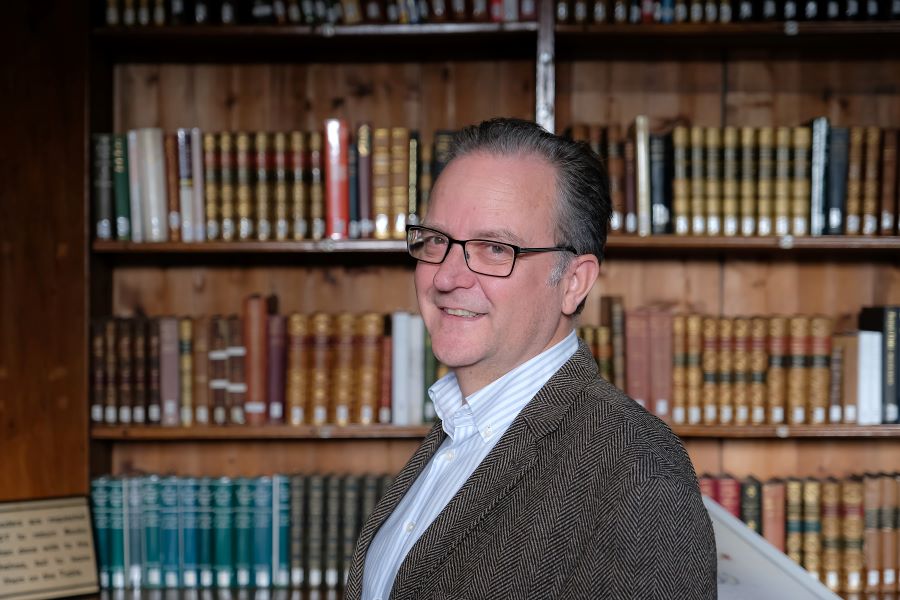
Pictured: Steve's contract as Chief Executive of the Priaulx Library runs until the end of 2024.
“The main collections here are books on local and family history but also complementary history because if you’re studying a period in Guernsey history it helps to know what was going on nearby in Jersey or in France or the UK. Guernseymen were trading all over the place of course, so we’ve got quite a collection of books from around the world. We’ve got lots of historic photos, a very extensive collection of newspapers and a large selection of historic maps. We don’t do so much on oral history, but that is something we could possibly develop in the future.”
Steve’s mention of the future leads us onto talking about his and his colleagues’ plans to develop the Priaulx during what remains of his three-year contract, renewable for a further three years.
“I spent the first six weeks going around asking lots of questions, not just about the Priaulx but how what we do relates to the Island Archives, Guernsey Museum and the Guille-Allès. This first year has been great. I have developed a vision with contributions and buy-in from the Council [which directs the Priaulx] and staff. I feel we are starting to see some fruits from that. The way I have encapsulated it is that we want to keep all the things people love about the Priaulx Library but at the same time bring it into the 21st century.
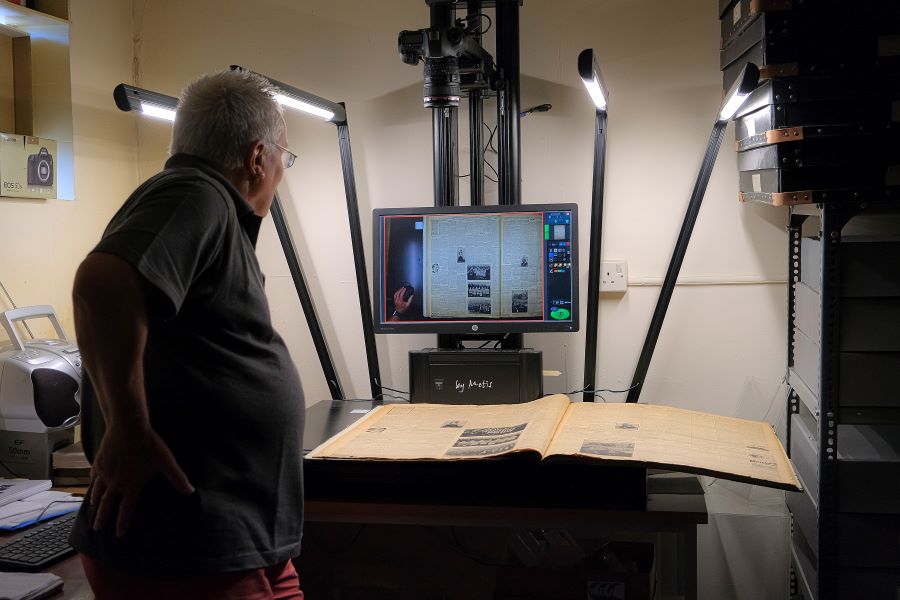
Pictured: The Priaulx Library holds an extensive collection of local newspapers.
“As a regular user, particularly when I was living in the UK, one of my frustrations was always that a lot of Guernsey family history records were not available online and they aren’t now. There has always been a certain amount of reticence because the question is asked: why would people come into the Library if we put everything online?”
The Priaulx welcomed around 1,500 visitors in October. “All the departments on the French coast have their records online; Jersey does; so do the counties on the south coast of England. Guernsey is a black hole. We must be missing a trick here, although one of the benefits of being last to the party is that you can learn from others’ successes and mistakes. I have had conversations with Jersey about how they went about it. We are building a plan to get it done.”
Discussions are ongoing with the two largest companies in the UK which digitise family history records. The company would make the upfront investment, transfer the information online and then charge users who want to access their family records with the Priaulx earning a small royalty fee from every user as well as having all records open for free if accessed from the Library itself.
“When Jersey did it, they did see a reduction in the number of people going into their library, but the people who went in had more complex queries because they were better informed to start with, so there is still a role to play assisting people. And you can host more events or seminars, which help build a community around a library. The ideal really is that you provide accessible services where people want them, which for a lot of people is online, but you offer more assistance and add more value at the Library and you also use it for events which build a sense of community.”
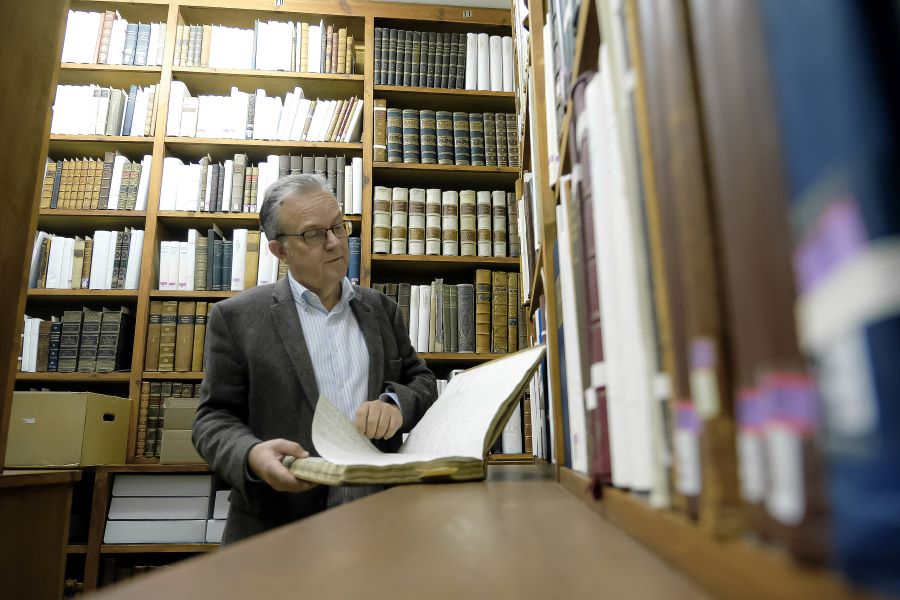
Pictured: Steve sees huge interest in local and family history. He is currently working with colleagues on plans to get more of the Library's local and family history online.
Steve points to the local Facebook page ‘Guernsey Days Gone By’ as an indicator of interest in local history in one form or another. It has 22,000 followers. The Priaulx Library has fewer than 900. “As far as I’m concerned, that is the size of the opportunity,” said Steve.
“I’m certainly not saying that this is all new and has never been looked at by the Priaulx before. There is an ongoing programme of digitising our newspapers. A lot of the images in our collection have been digitised. There is always a summer exhibition which is a popular event. It’s a case of taking digitisation further and putting on more exhibitions and more events to bring more people in and showcase what we’ve got here.
“Another reason to do it is that we have quite a lot of items which never get put on public display. Partly because of space constraints and partly because of their age and condition. Most of the Library is available, but there will always be some of the more fragile and vulnerable items we can’t put on public display. Exhibitions are a good way to invite people in to see some of the things which they can’t see otherwise.”
The Library recently hosted ‘The Priaulx After Dark’, an evening of fun, music and folklore. “After Dark was a bit of a shift and attracted attention. I can’t take too much credit for it and I’m grateful to staff who worked hard on it. It was well attended. We displayed a number of books from the darker side of our folklore collection which are normally locked in the strong room. It was good. It’s all about creating an environment in which people can come up with good ideas like this and run with them. It’s exactly the kind of thing we’re talking about – getting people into the Library who wouldn’t normally come in.”
Steve and local radio presenter Jim Delbridge have also started Guernsey Life & Times: The Priaulx Library podcast.
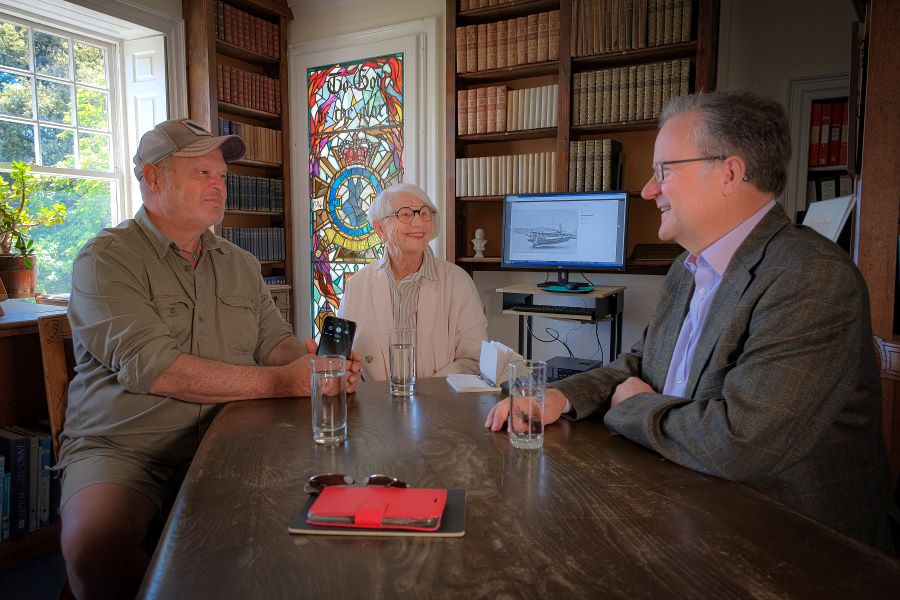
Pictured: Recording 'Guernsey Life & Times: The Priaulx Library' podcast, which was started in Steve's first year as Chief Executive.
Steve runs the Library three days a week. Much of the rest of his time is spent running Blue Ormer Publishing.
“Blue Ormer has the same origins as my role at the Priaulx: my passion for local history,” said Steve. His first venture into publishing was nearly 10 years ago. Peter Johnston, who wrote a history of Guernsey years ago, wanted to see his book back in print. With his professional project management experience, Steve was the ideal volunteer.
“I basically project managed it. I had to learn how you publish a book, find a printer, get it into bookshops, store the stock and promote it. I really enjoyed that. I got to know Edward Chaney and we said that we needed to get a book out about G. B. Edwards [author of the celebrated local book Ebenezer Le Page]. Edward was writing it and I agreed to publish it. I set up as a company just in case and it has gone from there. I think I will have published 12 books this year. The Post Office has given me a business account now, which is perhaps a milestone of activity.”
Steve is also heavily involved in the Guernsey Society, which maintains and stimulates interest around the world in what it calls ‘the spirit of Guernsey’, and sits on the Language Commission, which was set up by the States to protect and promote the island’s traditional language, Guernésiais.
Not a moment too soon, Steve now finds himself in exactly the right ‘No Ordinary Day Job’ to do what he loves best – “sharing with others this passion for local history”.
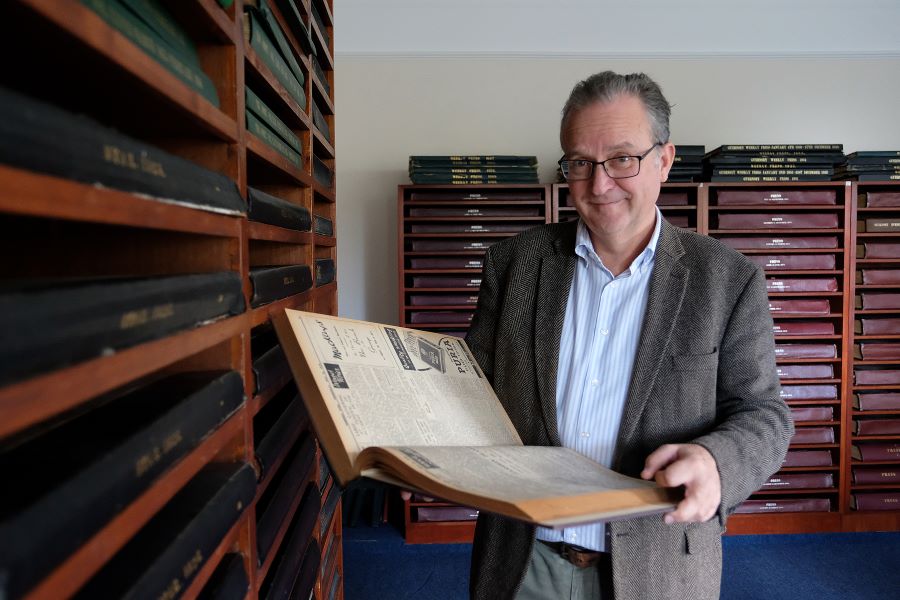
Pictured: Steve in the first floor room of the Library which holds decades' worth of local newspapers freely accessible to the public.
Credit for pictures: Paul Chambers
READ MORE...
CONNECT: Sending our iconic pullover around the world
CONNECT: 40 years on from hatching an export success story
CONNECT interview: Building for the Future of Primary Care
CONNECT interview: Meet the custodian of our island's heritage
CONNECT interview: The man behind the scenes at the KGV
FOCUS: A Life in Light and Darkness
FOCUS: Work-life balance is next challenge for PR expert
Comments
Comments on this story express the views of the commentator only, not Bailiwick Publishing. We are unable to guarantee the accuracy of any of those comments.